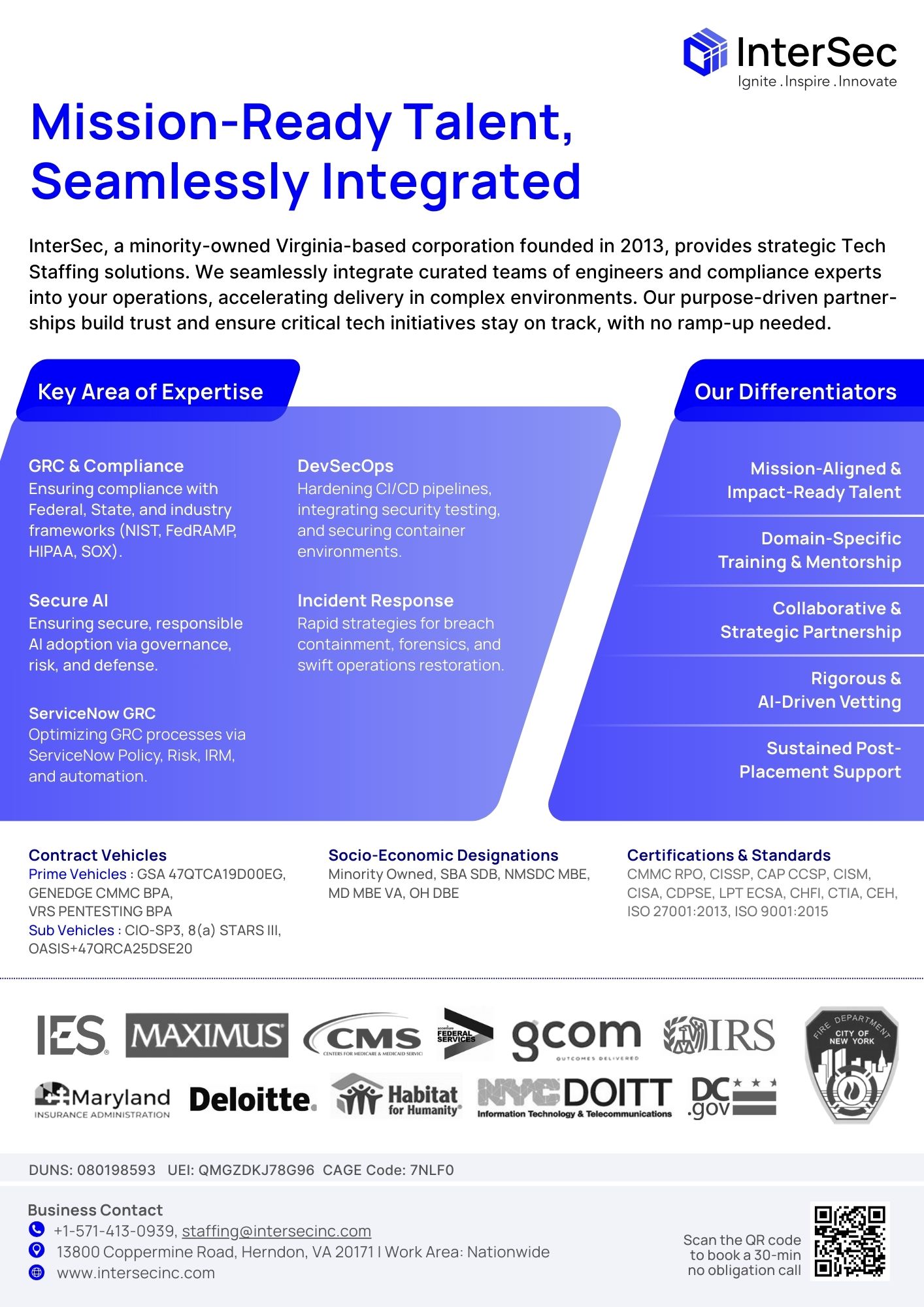.avif)
.svg)
.svg)

InterSec integrates into active programs and projects—reinforcing clarity and sustaining momentum.
Our delivery culture blends consulting discipline with operational precision. Whether through one experienced contributor or a full capability team, we remain outcome-aligned and accountable.
Clients trust us as an extension of their team—focused, steady, and aligned with what matters most: delivery that moves the mission forward.
.jpg)
We structure our services around market-driven, high-risk, high-impact areas that demand top-tier talent. Our domain focus evolves as new challenges arise—ensuring you receive context-aware specialists at every engagement.
Federal, State, and Industry Frameworks: NIST, FedRAMP, HIPAA, SOX
AI/ML Governance, Model Risk Management, Adversarial AI
Breach Containment, Forensics, Root Cause Analysis
CI/CD Pipeline Hardening, SAST/DAST, Container Security
Policy & Risk Modules, IRM Implementation, Automation


A federal contractor was preparing to deploy a machine learning model for behavioral threat detection across AWS and Azure environments. Their internal team lacked AI governance expertise, and their CISO flagged major risks around model explainability, drift, and adversarial inputs.
InterSec provided a Secure AI Architect with experience in NIST AI RMF and adversarial defense methods. The talent designed a secure ML pipeline, enforced differential privacy protocols, implemented model validation checks, and built red team test cases to simulate evasion attacks. The solution passed internal red-teaming and enabled the model to go live with documented governance and risk controls.
A SaaS company pursuing FedRAMP Moderate Authorization lacked a unified GRC platform and compliance team experienced in ATO preparation. Manual tracking and spreadsheet-based workflows created bottlenecks and risked audit failures.
InterSec staffed a GRC Program Manager and a ServiceNow GRC Engineer to lead policy mapping, automate POA&M tracking, and centralize controls management. Within six months, the team operationalized 325 NIST 800-53 controls within ServiceNow IRM, conducted internal assessments, and supported the company through a successful 3PAO audit and submission for FedRAMP ATO.
After a ransomware attack disrupted production systems, a healthcare technology firm discovered that their CI/CD pipeline had multiple security flaws, including unverified third-party dependencies and unsecured container registries.
InterSec deployed a DevSecOps Engineering Team with expertise in GitLab, SAST/DAST, and Kubernetes. The team rebuilt the CI/CD pipeline with integrated code scanning, image signing, and least-privilege IAM configurations. Within 45 days, they achieved pipeline hardening, reduced deployment cycle time by 30%, and eliminated critical vulnerabilities from the deployment path.
A financial services firm struggled with quarterly audit fatigue due to fragmented risk registers and outdated policy mapping tools. Their internal GRC team couldn’t scale to support regulatory needs across multiple jurisdictions.
InterSec staffed a ServiceNow GRC Analyst to configure and optimize IRM modules—focusing on policy and risk modules, control attestation workflows, and automated risk scoring. Within two quarters, the client reduced audit prep time by 30%, centralized their risk posture dashboard, and automated 70% of control evidence collection.
A public infrastructure agency faced a ransomware attack that encrypted several OT-connected systems. Their in-house IT team lacked experience with forensic analysis and containment procedures across hybrid networks.
InterSec mobilized a Cleared Incident Response Team within 24 hours. The responders isolated affected endpoints, performed memory forensics, and traced the attack vector to a misconfigured VPN appliance. Within 72 hours, they restored operations using clean backups, coordinated threat intel sharing with CISA, and produced a post-incident report for regulatory compliance and future prevention.
